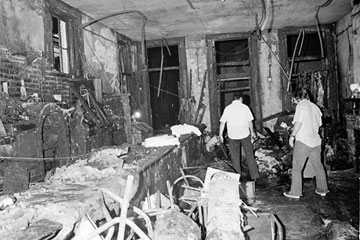
This is a view inside the UpStairs bar following a flash fire that left 29 dead and 15 injured, June 25, 1973. Most of the victims were found near the windows in the background. The bar is located in the New Orleans French Quarter.
(5 of 5)
Forty years later, much has changed. Today the Episcopal Church, the Presbyterian Church (USA), the Evangelical Lutheran Church in America and the Unitarian Universalist Church all ordain gay clergy. "I praise God more and more every day," Perry says. "We still have a battle there, there's still a fight going on, based on women and GLBT people, but we are going to win, and I know we are, and that's that." Yet even today, the fire is too difficult for many survivors to discuss. Many of those touched by the Upstairs fire were not militants for the gay-rights cause but just innocent victims. Rasmussen left New Orleans in 1991 for rural Arkansas, where he lives quietly with his partner Billy Duncan. They will soon celebrate their 40th anniversary, and they spend their time growing vegetables, volunteering at food banks and enjoying a simple life on their back porch. Warm but guarded, Rasmussen declines to talk about the fire. When history is written, he says, "they should leave that chapter out."
To its credit, the Catholic archdiocese apologized for its silence on the fire in a statement to Time. "In retrospect, if we did not release a statement we should have to be in solidarity with the victims and their families," New Orleans Archbishop Gregory Aymond said via e-mail on June 17. "The church does not condone violence and hatred. If we did not extend our care and condolences, I deeply apologize."
As for Dufrene, he still lives in the same small house where he was born and where he recovered from the fire. He now attends Harahan Baptist Church and says that while he identifies as gay, he has left the gay community. The fire, he admits, didn't start the gay revolution. "That was coming anyway," he says. But he says it helped to give gays in New Orleans a voice they didn't have before.
It is easy to forget that the GLBT movement is still young in the long arc of U.S. history. Events like the Stonewall riots have entered the canon while other, equally significant moments are little known. As Harvey Milk said not long before his assassination in San Francisco in 1978, "A reading of the Declaration of Independence on the steps of a building is widely covered. The events that started the American Revolution were the meetings in homes, pubs, on street corners." In a month that marks a potentially landmark Supreme Court ruling on same-sex marriage, the little-known and long-forgotten fire at the Upstairs is one such event.
Downs is an associate professor of history at Connecticut College
